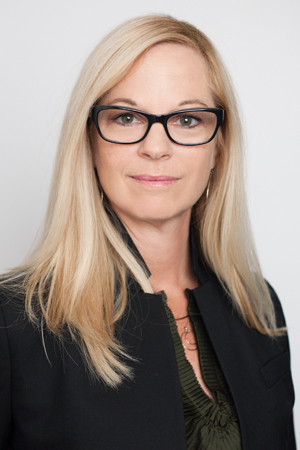- Editorial Offices
- 203 Brantly Hall
- Missoula, MT 59812
- (406) 243-2488
- themontanan@umontana.edu
Facetime: Lisa Parks ’90
2018 MacArthur Fellow Shares Her ResearchLisa Parks is the ultimate media scholar. When she’s not exploring digital privacy rights in Washington, D.C., or network ownership on the Blackfeet Reservation, she envisions what types of satellites soon might enter our skies.
 And now she is the recipient of a 2018 MacArthur Fellowship – also known as a “genius award” – which provides $625,000 to support her research on the cultural impacts of satellite and media technology.
And now she is the recipient of a 2018 MacArthur Fellowship – also known as a “genius award” – which provides $625,000 to support her research on the cultural impacts of satellite and media technology.
“I was very shocked when I got the call about the MacArthur Fellowship,” Parks says. “I’m honored, but it feels a little strange, because there are so many brilliant and creative people in the world.”
Parks, who teaches at the Massachusetts Institute of Technology, earned her Ph.D. at the University of Madison-Wisconsin but credits her background in political science and history at UM for helping develop her passions and curiosities.
“I think that my experience at UM actually gave me a rich platform to grow from intellectually, and it shaped my interests in geopolitics and social justice issues around the world,” she says.
Parks shared with the Montanan some details about her research and what’s next in the world of satellites, global media and information technologies.
Could you describe what geopolitics is?
This term has to do with the ways in which nation-states position themselves to achieve strategic advantage in international relations. It relates to everything from how they assert control over their territorial boundaries and natural resources; with whom they form partnerships, coalitions and foreign policies; and how they organize political and economic activities to accumulate power and control in a region, or even globally.
How did your interest in satellite technologies evolve?
The first countries to launch satellites were those that had a lot of financial and political power. I became interested in understanding how geopolitical and economic relations on Earth translate into orbit. By looking at satellites and the history of their development, I learned who the dominant players in space were and what kinds of satellites they were launching. Over time, I also explored how satellites supported the globalization of the internet and mobile telephone networks.
I’m really interested in facilitating technological literacy about and citizen engagement in our world telecommunication system. I try to think about these issues not only in the United States, but also in other countries where I’ve been working, such as Mongolia or Tanzania. Which countries own satellites and which do not? We have a lot to learn from the minor players or the nation-states on the fringes or outskirts of the systems of world power.
What surprised you in these countries?
A lot of people, when they think about technology and innovation, tend to think of places like Silicon Valley. When I go to rural Zambia or Tanzania, I’m amazed by the innovation and creativity of people in low-income communities. People re-use, repurpose and repair technologies like mobile phones, computers, television sets and radios, rather than throw them away. They have to figure out how to keep machines running because they do not have funds to buy new ones, and they have quite a bit of technical knowledge to share.
How do you see foresee satellite technology changing in the next couple decades?
Right now there is a major shift in the satellite industries. You have these new players from Silicon Valley – like OneWeb and SpaceX – developing non-synchronous satellite constellations in different orbits. The satellites are much smaller and cost less, and they’re going up in part to try an extend internet services to developing regions. So these emerging satellite constellations will likely change the way people access mobile phone systems and internet.
The other area where there’s a lot of experimentation is in remote-sensing satellites – satellites that are close to the Earth’s surface and constantly taking pictures. They’re used for archeology, military strategizing, meteorology, forestry and many other purposes. The costs and size of remote sensing satellites have dropped, and many more are being launched. There are a lot of things to keep track of up above.
What are some ethical problems or questions that arise?
If you look at the Outer Space Treaty of 1967, orbit and outer space were supposed to be owned by and used in the interest of all humankind. What we have seen is the privatization and the domination of orbit by a few rich companies and rich nation-states.
The UN Office for Outer Space Affairs tries to oversee and help provide guidelines related to the use of orbit and so does the International Telecommunication Union, but they have limited enforcement power. It’s up to us as citizens to keep informed about these issues, so that we can pressure leaders to abide by international treaties related to orbit and space. If we don’t, then we may see problems like orbital debris, congestion and pollution in orbit that increase the risk of objects falling back to Earth or intensified militarization of the domains surrounding the Earth.
What research are you currently doing in your lab?
In January, I took MIT graduate students to Tanzania to lead a workshop called Social IT Solutions. Tanzanian students worked in teams and developed six different projects using information technologies to address social challenges that ranged from accessing market prices of fresh produce to reducing wait times in long lines at the hospital or bank.
This spring my lab is starting up a reading group in the area of artificial intelligence and machine learning, and we will explore how media studies research interfaces with AI. There’s a lot of new research coming out, and MIT is a leader in that area. What are Google and Facebook doing with all of our personal data? How does Netflix know which movies or TV shows we want to watch? These are the kinds of issues we will be getting into.
Any major takeaways?
I want to convey a message to UM students. I hope they will think in really ambitious ways about what they can do in this world and where they can go. I had no idea when I was a UM student that I would have a career doing research on satellites, global media and information technologies and would be honored with a MacArthur Fellowship. Dream big, give back and go for it.
Interview by Courtney Brockman ’17




